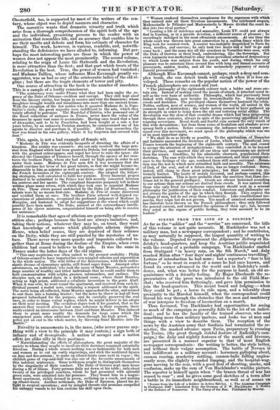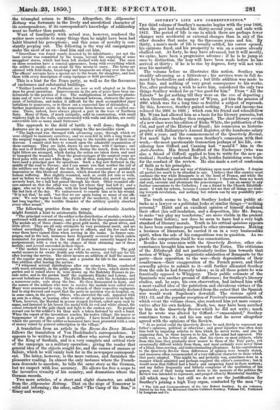SCENES FROM THE LIFE OF A. SOLDIER. * As far as
the " soldier " and the " service " are concerned, the title of this volume is not quite accurate. M. Hacklander was not a military man, but a newspaper correspondent ; and he contributes, as may naturally be supposed, the largest quantity of writing to the volume. Deputed to represent the Allgetneine Zeitung at Ra- detsky's head-quarters, and keep the Austrian public acquainted with the events of a probable campaign, Von Haeklander stn from Stuttgard "in -heavy rain, on the 8th March," and, duly. reached Milan after " four days' and nights' continuous have " Letters of introduction he had none ; but a reporter's " face is leis fortune," so he went in search of a name he had once known, and found its owner advanced in the world and in Radetsky's confi- dence, and, what was better for the purpose in hand, an old ac- quaintance with a friendly feeling. By Major Eberhardt the re- presentative of the press was introduced to the old Field-Mar- shal; who received him flatteringly, and gave himrmission to join the head-quarters. This meant board and lodging—when they could be got ; a horse to ride upon, and a to erably close proximity to the Marshal himself, when the correspondent could thread his way through the obstacles that the men and machinery of war interpose to freedom of locomotion on a march. Thus favoured, Von Hacklander had opportunities for seeing as much of the campaign as generally falls to the lot of an indivi- dual ; and he has the faculty of the trained observer, who sees something more than military matters, and looks too at men and things with a view to describe them. The reception of the news by the Austrian army that Sardinia had terminated the ar- mistice, the masked advance upon Pavia, preparatory to crossing the Tecino, (the great though riskful feature of Radetzky'a cam- paign,) the daily and nightly features of the nl,iii: and bivouac, are presented in a manner superior to that "of 5iost Fmglish newspaper correspondents : the writing is better, the style better, and without their -vulgar assumption. The battle of Novara is but indifferent as a military account : horsemen galloping about, cannon roaring, musketry rattling, cannon-balls falling unplea- santly near, the slightly wounded limping, and the hospital-wag- gons moving to the rear, with a good deal of shouting, smoke, and confusion, make up the sum of Von Ilacklander's warlike picture. The reporter is himself again when " the brazen throat of war has ceased to roar " ; and he gives some good sketches of a town after a battle in its immediate neighbourhood, as well as of scenes on • Scenes from the Life of a Soldier in Active 8ervice. 1. The Austrian Campaign in Piedmont, 1849: translated from the Gentian of F. W.:11acklander. 2. Notice of the Defence of Temeswar. 3. The Camp of the Ban. Published by Murray. the triumphal return to Milan. Altogether, the Allgemeine Zeitung was fortunate in the lively and aneedotical character of its correspondence, if its correspondent's knowledge of soldiership went no further than parade. . Want of familiarity with actual war, however, rendered the writer more sensible to many things than he might have been had habit blunted his perceptions ; and this sense of novelty is con- stantly peeping out. The following is the way old campaigners make the most of an ox—load him and eat him.
" Gravellone was found nearly deserted by its inhabitants ; yet not the least excess was committed by the troops, beyond the emptying of some smugglers' stores, which had been left stocked with Asti wine. The oxen on these occasions have a comical appearance, hung with everything which the soldier is unable or can avoid by this means to carry. The horns are adorned with field-flasks, bread-bags and knapsacks are slung over the back. The officers servants have a special eye to the beasts for slaughter, and load them with every description of camp equipage or field provision."
This is a hint for the Peace party, as well as for the favourers of enclosures and substantial buildings.
"Neither Lombardy nor Piedmont are now so well adapted as in those days for great operations. Improvements in the arts of peace have been un- favourable to the practice of war. The multiplication of mulberry-planta- tions and of rows of trees with vines festooned between, obstructs the move- ment of battalions, and makes it difficult for the most accomplished jbger battalions to inanceuvre, or to throw out a connected line of skirmishers. A further impediment exists in the numerous farm-houses and so-called eas- sine. These indeed, have always played a part in the wars of Northern Italy. Mani of them, of much antiquity, solid in construction, with small windows high in the walls, and surrounded with walls and ditches, are easily convertible into so many small fortresses."
The approach to the field of battle is well done; though its features are in a great measure owing to the novioelike view.
"The high-road was thronged with advancing corps, through which we were obliged to insinuate ourselves; and we soon fell in with a long train of the surgical waggons, which were hurrying to the terrible spot of their ren- dezvous. I cannot omit here to remark upon the admirable organization of these carriages. They are light, drawn by one horse, with C springs ; and the seat is of flexible girths, upon which, during the march, from five to six light litters are arranged, which during the action are taken down and used to transport the wounded. " Near the great carriages of the surgical corps are fixed poles with red and white flags ; each of these designates to those who have need a principal spot for operations. Such a flag now fluttered in the middle of the road to Novara; - and I can assure you that neither the roll of the artillery nor the sight of the dead in Mortara occasioned so painful an impression' as this blood-red streamer, which denoted the place of so much human suffering. Men slightly wounded, such as could yet ride or walk, met us before we reached the village. General Stadion also passed us, more severely hurt, for a ball had passed through his chest. Other wounded offi- cers assured us that the affair was very hot where they had left it ; and a jager, who sat by a ditch-side, with his head bandaged, exclaimed against the bad luck of the day. We endeavoured to console gim as to his wound.
not that,' he said, but that we are again losing so many of our offi- oers. We now began to hear the sputter of the musketry, but it did not last long together • the terrible thunder of the artillery quickly absorbed every other sound."
The following practice from the army of aristocratic Austria might famish a hint to aristocratic Britain.
' The principal reward of the soldier is the distribution of medals ; which is performed with much ceremony, and is a festival for the regiment concerned. fibs medals are of three classes—the great gold medal, the great silver, and little silver..' They are all only attainable by very prominent merit, and are valued accordingly. They are not given to officers, and the few such who wear them have earned them when serving in the ranks. In former cam- paigns, and in the last, instances have frequently occurred in which cadets nominated for promotion to the rank of lieutenant earnestly begged for a postponement, with a view to the chance of their obtaining one of these medals; and several succeeded in their object. "The medals have a pecuniary as well as an honorary value. The gold medal secures to its owner double pay while he serves, and full pay for life alter leaving the service. The silver secures an addition of half the amount of the regular pay during service,and a pension for life to the amount of that addition after leaving the service. "I witnessed several distributions after our return to Milan, conducted with much solemnity, in the public garden. On the Corso, which skirts the i garden and is raised above it, were drawn up the Radetsky Hussars in pa- rade order, and in the garden itself the regiments Kinsky and Latour, and several battalions of Granzers.. The Field-Marshal, with the Archdukes and a numerous suite, rode along the line. He then dismounted in front, and the names of the soldiers who were to receive the medals were called over. Many were summoned in vain, for the colonels of their respective regiments had to step forward and report that the party in question was in hospital, or, in some cases, in the grave. Others, who answered the call, appeared with an arm in a sling, or bearing other evidence oft injuries received in battle. When, however, the Marshal in person stepped forward, called upon each by name, and fastened to his breast the medal with its red and white riband, the colour returned to the pale cheek and light to the sunken eye. No prouder reward can ■be tlivsoldier's lot than such a token fastened by such a hand. When the report of the investiture reaches his:native village, the mayor or burgomaster of the place reads it in public. I have heard of instances in which the parents of the soldier so honoured have been presented with a sum of money raised by general subscription in the village.'
A translation from an article in the Revue des Deux Mondes follows the translstion of Von Hacklander's correspondence. It appears to be written by a French officer who served in the army of the King of Sardinia, and is a very complete and critical view of the campaign as a military operation ; giving the reader that general idea of the objects sought for, and the causes of success or failure, which he will vainly look for in the newspaper correspond- ent. The latter, however, is the more various, and furnishes the pleasanter reading. In almost the only instance where the French- man descends to anecdote, he tells the same story as the German, but we suspect with less accuracy. He allows too free a scope to the inventive vivacity of his country, and dramatizes where the German records.
Two more articles, of a short and slight character, are added from the Alkemeine Zeitung. That on the siege of Temeswar is solid and informing; the other, called "The Camp of the Ban," is flimsy and wordy.



























 Previous page
Previous page